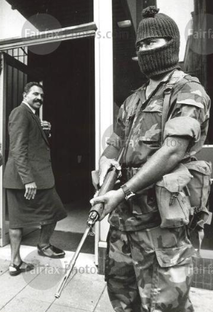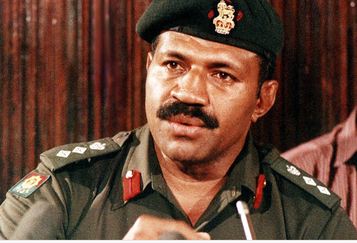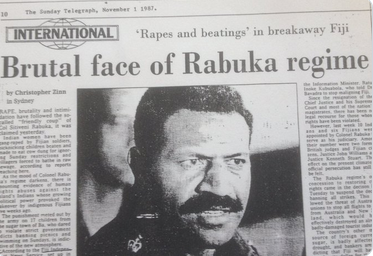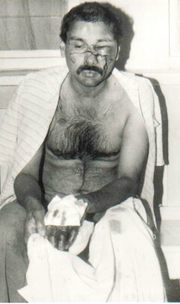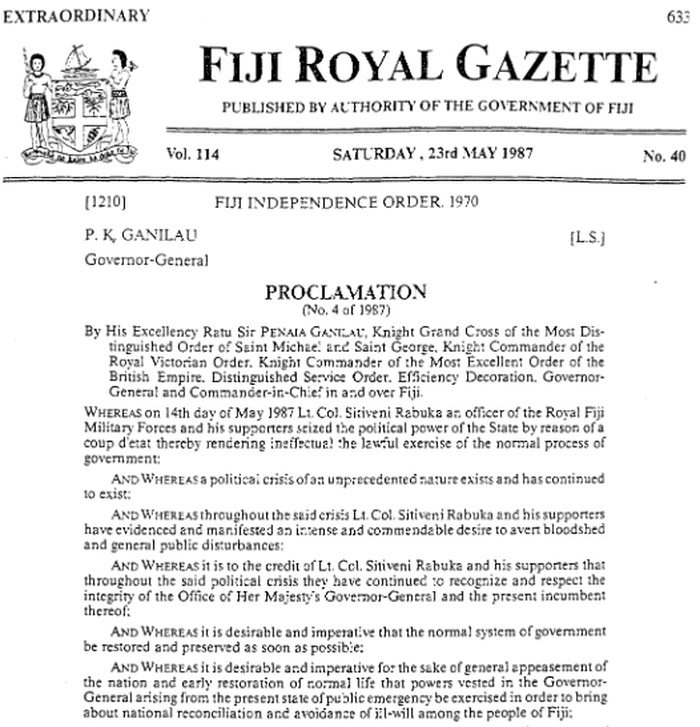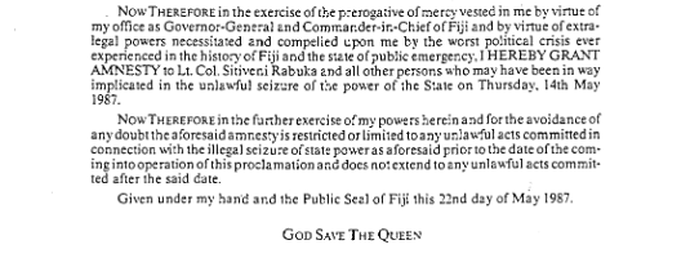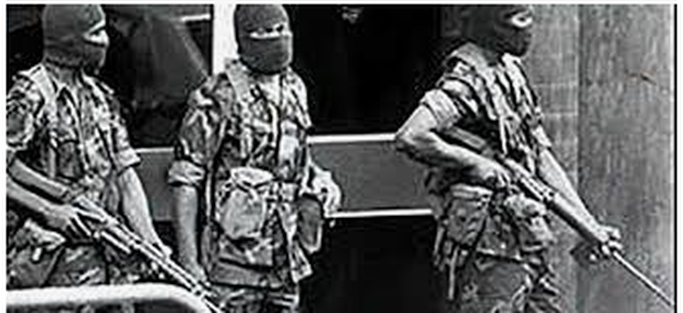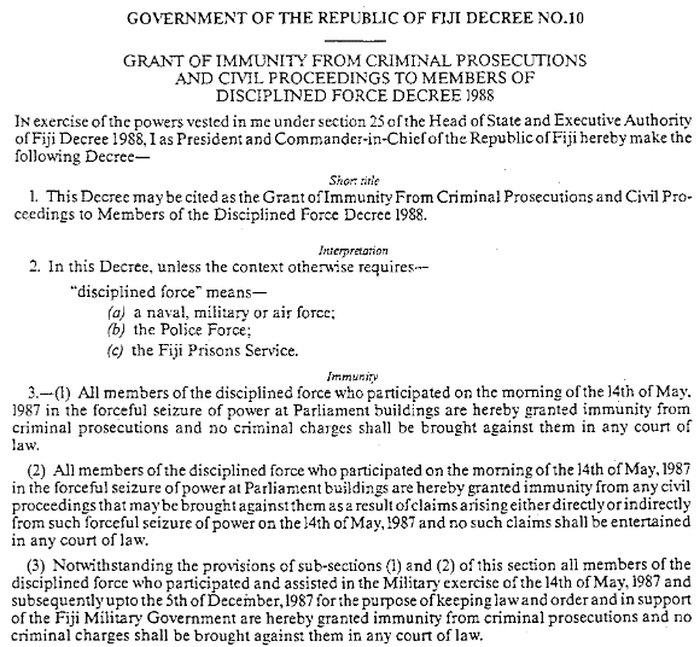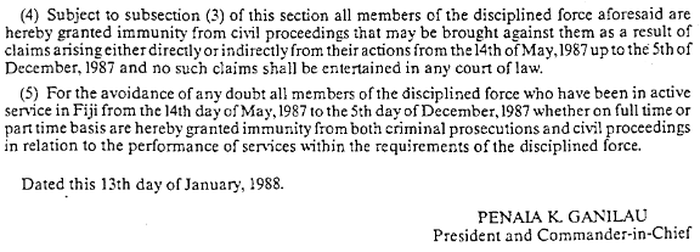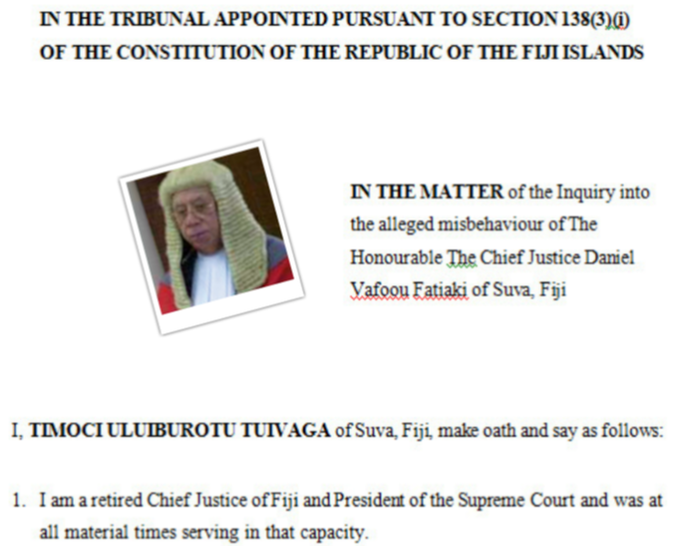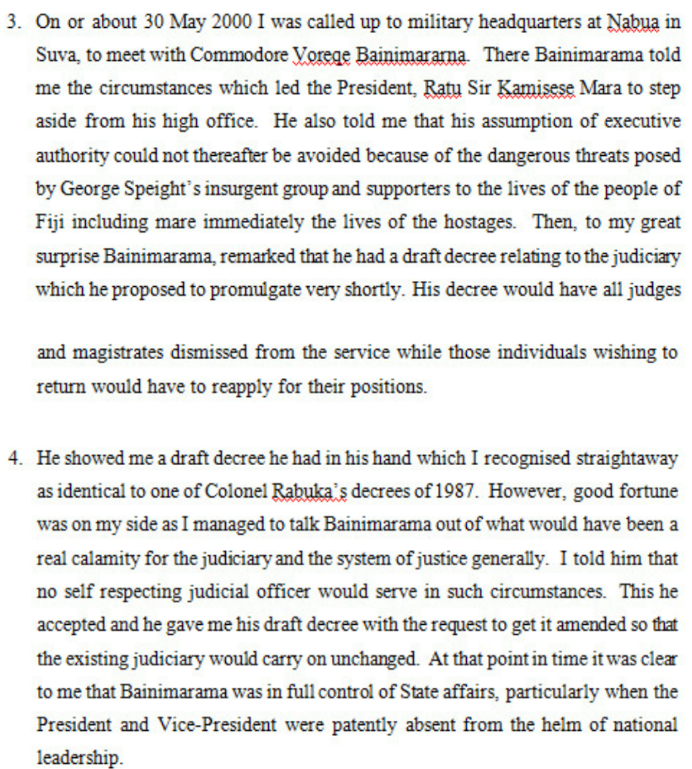Fijileaks: During the 1987 Rabuka coups, Ro Filipe Tuisawau's father, the late Ratu Mosese Tuisawau, was so sickened by the wholesale rape, torture, beatings and harrassment of Dr Timoci Bavadra's supporters, both ethnic Fijians, Indo-Fijians, including Others, that he was willing to arm his supporters to overthrow the Rabuka regime - for he and others were not prepared to see the birth of Fijian 'Adolf Hitler' in the South Pacific. Ratu Mosese, an advisor to Dr Bavadra, was among the 21 charged with conspiring with others to import arms and ammunition illegally into Fiji and to instigate an invasion.
Again, one saw similar allegations levelled against the deposed Prime Minister, the late Laisenia Qarase. Bainimarama claimed that Qarase had sought military intervention from Australia and New Zealand in the days leading up to the 2006 coup. In 2008, while giving evidence in the High Court over his dismissal as Prime Minister, Qarase admitted he spoke to then Australian Prime Minister John Howard and his New Zealand counterpart Helen Clark on possible military assistance - not military intervention. The lawyer for the Bainimarama interim regime alleged Qarase's Home Affairs Minister had recommended military intervention in a paper that was disucssed by Fiji's National Security Council, which Qarase chaired. Qarase denied any knolwedge of the paper dated 28 November 2006. Rabuka's coups opened up the spectre of foreign invasion
ON 22 May 1987, the current SODELPA leader Rabuka, now wanting another crack at the job, got himself IMMUNITY from Prosecution for his treasonous coup, to enable him to terrorize and hold Fiji's population under his military boots and the guns. On 13 January 1988, he got it also for his military foot soldiers, so to enable them to continue with their rapacious reign of terror and violence. In some instances, Indo-Fijian women suffered miscarriages after his military thugs made midnight raids. He extended the immunity to scores of hardened native Fijian criminals he had released from prison to march onto Government House to persuade his traditional chief and then Governor-General Ratu Sir Penaia Ganilau to cave into his demands to disenfranchise Indo-Fijians and urban native Fijians, and to ensure Dr Bavadra never returned as PM. The criminal thug in uniform, and guns, got his way but at a great cost to Fiji, spawning in its wake counter terror and bombings to teach him a lesson. The Immunity he granted to himself and his soldiers continues in 2020. Frankly speaking, Frank Bainimarama's 2006 Coup is like picnicking on Nukulau Island, in comparison to Rabuka's racially motivated and blood-curling coups. From outside, looking into Fiji in 1987, one thought the Nazis were running amok in the country. There is enough in his FILE to bundle him off to The Hague For Trial for Crimes Against Humanity
YOU ARE WELCOME TO READ HIS CV FOR LEADER OF SODELPA
Fijileaks Editor: The former Chief Justice Sir Timoci Tuivaqa's unpublished affidavit on us that denies Justice Daniel Fatiaki helped draft the Justice Decree 2000. But what is of interest is his revelation how Bainimarama had in his hand a copy of Judiciary Decree which Sir Timoci recognised straighaway as identical to Rabuka's 1987 Decree
THE REPUBLIC OF FIJI
FIJI JUDICATURE DECREE 1987
DECREE NO. 4
[LEGAL NOTICE No.2]
IN exercise of the powers vested in me as Commander and Head of the Interim Military Government of Fiji, I hereby make the following decree:
1. This Decree may be cited as the Fiji Judicature Decree 1987.
2.-(1) There shall be an Judicial Advisory Committee which shall consist of three persons, one of whom shall be the Chairperson and one other than the Attorney-General. They shall be appointed to the said Committee by the Commander and Head of the Interim Fiji Military Government.
(2) The Solicitor General of Fiji Interim Military Government shall act as Secretary of the Judicial Advisory Committee.
3. The Judicial Advisory Committee may, with the consent of the Head of the Fiji Interim Military Government, by regulation or otherwise regulate its own procedure and, subject to its rule of procedure, may function notwithstanding any vacancy in its membership or the absence of any member.
4. The Judicial Advisory Committee shall be empowered to make appointments to the following judicial offices:
(1) Chief Justice;
(2) President of the Court of Appeal;
(3) Vice President of the Court of Appeal;
(4) Justice of Appeal;
(5) Puisne Justices of the Supreme Court of Fiji.
5. The Judicial Advisory Committee shall be empowered to make appointments to the following offices:
Central Agricultural Tribunal
Chief Registrar of the Supreme Court
Deputy Registrar of the Supreme Court
Assistant Registrar of the Supreme Court
Solicitor-General
Crown Solicitor
Chief Legal Draftsman
Principal Legal Draftsman
Senior Legal Draftsman
Senior Magistrate
First Class Magistrate
Second Class Magistrate
Third Class Magistrate
Principal Legal Officer
Senior Legal Officer
Legal Officer
6.-(1) Subject to this and any other Decree, any Court of Law, authority or office which was established, any appointment which was made, and any other thing whatsoever which was done before 25th September 1987 in pursuance of any provision of the Constitution of Fiji 1970 Cap. 1 shall be dissolved and all appointments made shall be removed and declared vacant pending appointments by the Judicial Advisory Committee.
(2) The Courts of Law and appointments with respect to which this section of Decree applies are the Supreme Court of Fiji and the Court of Appeal and the judges who held office in those Courts as at 25th September 1987.
(3) The offices of Chief Registrar, Deputy Registrar and Assistant Registrar are hereby declared to be not affected and preserved in respect of their incumbents by virtue of this sub-section of this Decree.
7. There shall be a Supreme Court of Fiji which shall have unlimited original jurisdiction to hear and determine any civil or criminal proceedings under any law and such other jurisdiction and powers as may be conferred on it by this Decree or any other Decree.
8. The judges of the Supreme Court shall be the Chief Justice and such number of puisne judges as may be prescribed by the Executive Council.
9.-(1) The Chief Justice shall be appointed by the Commander and Head of the Interim Military Government of Fiji acting after consultation with the Executive Council and the Judicial Advisory Committee.
(2) The puisne judges shall be appointed by the Commander and Head of the Interim Military Government of Fiji acting after consultation with the Judicial Advisory Committee.
(3) Persons eligible for appointment as judges of the Supreme Court of Fiji must:
(a) hold or have held judicial office at 1east equivalent to the office of a judge of the Supreme Court of Fiji in any country outside Fiji but within the Commonwealth or such other country as the Judicial Advisory Committee deems appropriate; or
(b) is qualified to practise and has practised as an advocate and has been so qualified for not less than five years in such Court.
(4) Computation of the period of qualification for the purpose of the preceding subsection shall include any period served as a judicial officer in addition to any time spent as a qualified practitioner as defined in subsection 9 (3) of this Decree.
(5) During any vacancy in the office of Chief Justice or the office holder is unable for whatever reason to perform the functions of his office, then until an appointment has been made or the Chief Justice has resumed office, those functions shall be performed by such one of the puisne judges of the Supreme Court as the Commander and Head of the Interim Military Government of Fiji, acting after consultation with the Executive Council, may appoint for that purpose.
(6) Where a person so appointed is not a puisne judge notwithstanding the resumption or assumption of office and the functions of Chief Justice, he may continue to act as a judge of the Supreme Court for so long as it may be necessary to enable him to deliver judgment or do anything in relation to proceedings that were commenced before him.
(7) During any vacancy in the office of puisne judge for whatever reason or where the Commander and Head of the Interim Military Government of Fiji is advised by the Chief Justice that the state of business in the Supreme Court requires a temporary increase in the number of judges; then the Commander and Head of the Interim Military Government of Fiji may appoint persons qualified for appointment as acting judges of the Supreme Court on the recommendation an after consultation with the Judicial Advisory Committee.
Provided that any such appointment shall despite expiry or revocation still enable that appointee to deliver judgment or do anything that may be necessary in relation to the proceedings that were commenced before him.
(8) Judges of the Supreme Court shall hold Office until attaining retiring age on which they shall vacate office. Where judges have attained retiring age they may continue in office for so long thereafter as may be necessary to enable judgment to be delivered or to do any act in relation to proceedings commenced before him prior to attaining retiring age.
(9) The retiring age of judges of the Supreme Court is sixty (60) or such other age as the Executive Council may determine from time to time. Where the retiring age is altered to the extent that it alters the age at which judges of the Supreme Court shall vacate office, it shall not have effect in relation to judges where it occurs after their appointment unless they consent to it having effect.
10.-(1) Judges of the Supreme Court shall be liable for removal from office only for-
(a) inability to perform the function of his office whether from infirmity of body or mind or any other cause;
(b) misbehaviour.
(2) Removal of judges from office shall only occur in accordance with the provisions of this Decree. Where the question of his removal has been made at the request of the Commander and Head of the Interim Military Government of Fiji, it shall be done by referring the matter to a tribunal to be set up after consultation between members of the Executive Council excluding the Commander and Head of the Interim Military Government of Fiji.
(3) The Tribunal referred to above shall be a body consisting of a Chairperson and not less than two other members, selected by the Executive Council in consultation with the Judicial Advisory Committee from among persons who have held judicial office at least at the Supreme Court level in Commonwealth countries; or such countries as may be deemed appropriate or from retired Fiji Supreme Court Judges.
(4) The Tribunal shall enquire into the matter and report on the facts together with a recommendation and advise the Executive Council whether it should order removal of the judge. Upon being so advised the Executive Council shall act in accordance with the advice. Pending the conduct of the inquiry and its recommendations the judge so affected shall be suspended from office, such suspension to be revoked forthwith on receipt of the Tribunal's recommendation that no action be taken for the removal of the judge.
(5) Where the recommendation to refer the conduct of a Judge is made by the Chief Justice then the same provisions will apply as appear above save for the implementation of the Inquiry and the suspension from office and if necessary the removal shall be by and under the hand of the Commander and Head of the Interim Military Government of Fiji.
11. A judge of the Supreme Court of Fiji shall not enter upon the duties of office until he has subscribed the oath of allegiance and due execution of office as are prescribed by Schedule 1 to this Decree.
12. There shall be a Court of Appeal of Fiji having such jurisdiction and powers as may be conferred on it by this Decree or any other Decree.
13. The Justices of the Court of Appeal shall be-
(a) the Chief Justice;
(b) the President of the Court o Appeal;
(c) the Vice-President of the Court of Appeal;
(d) such Justices of Appeal as may be appointed under the next following section.
14. The Justices of Appeal shall be appointed by the Commander and Head of the Interim Military Government of Fiji acting after consultation with the Executive Council and the Judicial Advisory Committee.
15. A person shall not be qualified to be appointed under the preceding section unless he is qualified for appointment as a Judge of the Supreme Court.
16. A Justice of Appeal shall not sit as a judge of the Court on the hearing of an appeal-
(a) from any decision given by himself or any decision given by any Court of which he was sitting as a member; or
(b) against a conviction or sentence if he was the judge by or before whom the appellant was convicted.
17. During vacancies of positions for any of the Justices of Appeal for whatever reason the provisions relating to vacancies on the Supreme Court referred to in subsections 9 (5), (6) and (7) shall apply mutatis mutandis to the Court of Appeal.
18. A Justice of Appeal shall vacate his office upon the expiration of the period of appointment to that office. Such period shall be not less than 3 years. It is further provided that an appointee may continue in office for as long as may be necessary to enable him to deliver judgment or do anything required in relation to proceedings commenced before him.
19. A Justice of Appeal may be removed from office only for:
(a) inability to perform the function of his office, whether infirmity of body or mind or any other cause;
(b) misbehaviour.
20. The procedure for removal of a Justice of Appeal shall be in accordance with the provisions of this Decree as set out in Section 10 and shall apply mutatis mutandis to Justices of the Court of Appeal.
21. A Justice of Appeal shall not enter upon the duties of his office until he has taken and subscribed the oath of allegiance and the due execution of his office as is prescribed by schedule 1 to this Decree.
22. The Supreme Court shall have jurisdiction to supervise any civil or criminal proceeding before subordinate Court and may make such orders, issue such writs and give such directions as it may consider appropriate for the purpose of ensuring that justice is duly administered by any such Court.
23. An Appeal to the Court of Appeal shall lie from decisions of the Supreme Court in the following cases –
(a) as of right from final decisions in any civil or criminal proceedings;
(b) as of right from final decisions given in exercise of the jurisdiction conferred on the Supreme Court by Section 22 of this Decree;
(c) in such other cases as may be prescribed.
24. The Court of Appeal is the final Court of Appeal.
25. –(a) This Decree is to remain in force until otherwise ordered or modified by later Decree;
(b) This Decree may be cited as the Fiji Judicature Decree 1987 and shall apply throughout Fiji;
(c) This Decree shall be deemed to have come into force on 25th September 1987.
Dated 3rd October 1987.
COL. SITIVENI LIGAMAMADA RABUKA, O.B.E. (Mil.)
Commander and Head of the Interim Military Government of Fiji
_____
SCHEDULE 1
I ............................................... do swear (or solemnly affirm) that I will be faithful and bear true allegiance to the Commander and Head of the Interim Military Government of Fiji, its heirs and successors, according to law. So help me God (To be omitted in affirmation).

